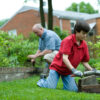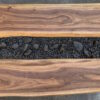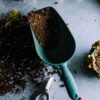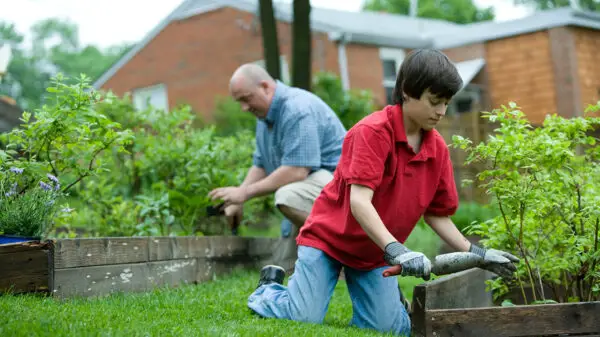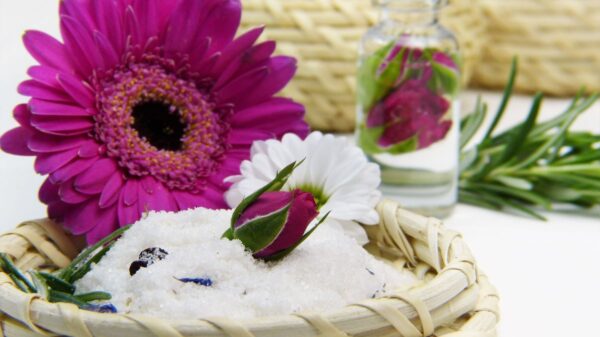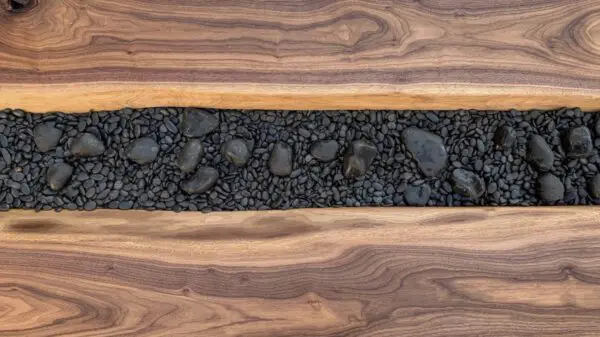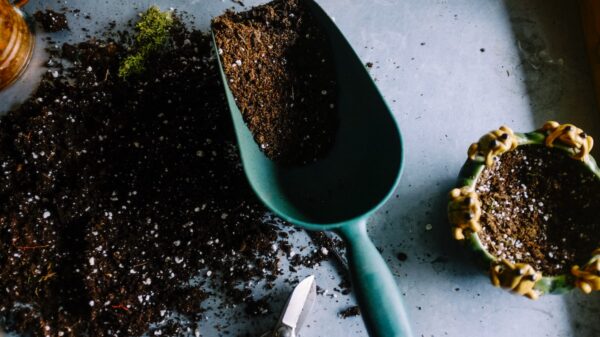How To Grow Herbs In A Microgarden Organically, Without Chemicals Or Pesticides
When it comes to growing herbs in a microgarden, many enthusiasts prefer to follow organic practices. Organic gardening promotes sustainability and reduces the exposure to harmful chemicals and pesticides. By using natural methods and techniques, you can cultivate flavorful and healthy herbs right in your own backyard. In this article, we will explore the organic practices you should follow for successful herb cultivation in a microgarden without the use of chemicals and pesticides.
Organic practices offer numerous benefits for growing herbs in a microgarden. By avoiding the use of chemicals and pesticides, you ensure that your herbs are free from harmful residues. Organic gardening also promotes soil health and biodiversity, creating a balanced and sustainable ecosystem. Additionally, organic herbs are known to have higher nutritional value and enhanced flavor compared to conventionally grown herbs. Now, let’s delve into the organic practices you should follow for growing herbs in a microgarden.
Organic Soil Preparation and Nutrient Management
- Choosing the Right Soil. To provide a healthy foundation for your herbs, start by selecting the right soil. Opt for organic potting soil or create your own by combining equal parts of compost, peat moss, and vermiculite. This mix provides adequate drainage while retaining moisture and essential nutrients.
- Composting. Composting is a key practice in organic gardening. It enriches the soil with nutrients, improves its structure, and promotes beneficial microbial activity. Start a compost pile using kitchen scraps, yard waste, and dry leaves. Regularly turn the pile to facilitate decomposition, and after a few months, you’ll have nutrient-rich compost ready for your microgarden.
- Mulching. Apply a layer of organic mulch around your herbs to conserve moisture, suppress weed growth, and regulate soil temperature. Organic mulch options include straw, shredded leaves, or wood chips. Mulching also improves soil fertility as the mulch breaks down over time.
- Natural Fertilizers. Avoid synthetic fertilizers and instead opt for natural alternatives to nourish your herbs. Use organic fertilizers such as compost tea, seaweed extracts, or fish emulsion. These provide a slow release of nutrients, ensuring steady growth and flavor development in your herbs.
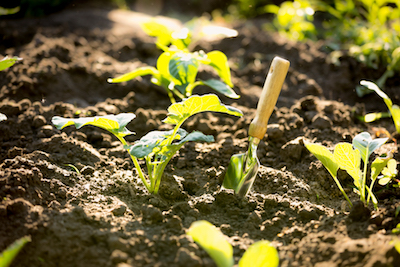
Watering and Irrigation For Your Microgarden
Watering is crucial for herb growth, and it’s important to do it right. Provide adequate water to your herbs, ensuring the soil is consistently moist but not waterlogged. Regularly check the moisture level by inserting your finger into the soil. If it feels dry, it’s time to water.
You should also practice water conservation by utilizing methods like drip irrigation or a soaker hose. These techniques deliver water directly to the roots, minimizing wastage through evaporation or runoff. Collecting rainwater in barrels is another effective way to conserve water and reduce your ecological footprint.
Pest and Disease Management When Organically Growing Herbs In A Microgarden
- Companion Planting. Companion planting involves growing certain plants together to enhance growth and repel pests naturally. For example, planting marigolds or lavender alongside your herbs can deter pests like aphids and whiteflies. Research companion planting options for your specific herb varieties to create a harmonious and pest-resistant microgarden.
- Beneficial Insects. Invite beneficial insects like ladybugs, lacewings, and bees into your microgarden. These insects prey on harmful pests, helping to keep their populations in check. You can attract them by planting flowers such as daisies, cosmos, or alyssum.
- Homemade Pest Repellents. Create natural pest repellents to protect your herbs from common garden pests. For instance, a mixture of water, soap, and chili pepper can deter insects like aphids and caterpillars. Neem oil is also effective against a wide range of pests and fungal diseases.
What To Know About Growing Herbs In An Outdoor Microgarden
The great thing about starting a microgarden is that it can be done indoors or outdoors. If you’re considering starting an outdoor microgarden of your own, there are some things to keep in mind when it comes to caring for your plants and ensuring they produce the best flavor and health benefits.
Sunlight is an essential component in growing herbs outdoors, as it helps to fuel the photosynthesis process that produces energy for the plants. Herbs generally need 6-8 hours of direct sunlight per day, so make sure you choose a spot for your microgarden that is in full sun. Watering should be done on an as-needed basis, as giving too much or too little water can lead to stressed plants. If you see the top layer of soil is dry, that’s a sign that your herbs need some hydration.
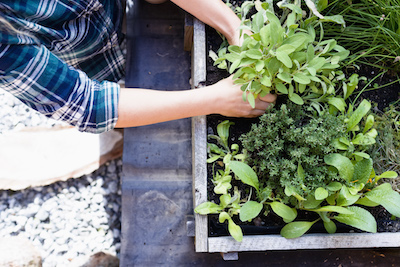
Harvesting and Storage Of Herbs
It’s important to know how to properly time your microgarden harvest. Harvesting your herbs at the right time ensures they are at maximized flavor and potency. Most herbs are best harvested in the morning, after the dew has dried but before the sun gets too hot. In addition, the best time to harvest herbs is when they are in full bloom. This way, the herbs will be at their most potent, providing you with the highest concentration of active ingredients and nutrients. When harvesting herbs, it’s important to take only what is needed, as over-harvesting could lead to a decrease in natural herb populations. It’s also important to handle them carefully to avoid damaging any leaves or stems.
After harvesting, it’s best to dry the herbs in a well-ventilated area away from direct sunlight, since this could fade their color and reduce their potency. Once fully dried, you can store your herbs in an airtight container for up to two years. Another way to preserve your fresh produce is to make herbal oils or tinctures, which will help to keep the active ingredients and nutrients potent for longer. With proper harvesting and storage techniques, your herbs can provide you with fresh flavor and health benefits for months to come.
Herbs That Grow Best In A Microgarden
When choosing herbs for your microgarden, it’s important to select plants that are well-suited to the climate you live in. It’s also good to note that many herbs are fine with small spaces such as:
- Parsley
- Chives
- Oregano
- Sage
- Thyme
- Rosemary
- Mint
Some of the most common herbs grown outdoors include basil, chives, dill, oregano, parsley, rosemary, sage, and thyme. These herbs all require similar growing conditions and can be harvested multiple times throughout the growing season.
Benefits Of Organic Practices When Growing Herbs
Organic practices such as composting and mulching can provide powerful benefits to your microgarden. Compost adds vital nutrients back into the soil, which helps promote healthier plants and deeper root systems. Mulch helps retain moisture in the soil, prevents weed growth by blocking out light, and also acts as an insulator against temperature changes. These organic practices help create a richer, more diverse environment for your herbs to thrive in.
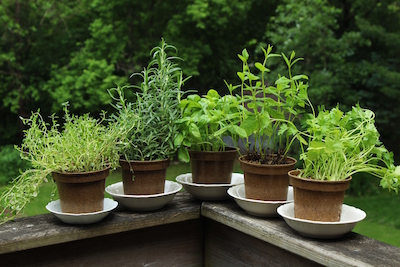
Things To Avoid When Growing Organic Herbs In A Microgarden
When growing herbs in a microgarden, it’s important to avoid over-fertilizing or using chemical pesticides and herbicides. Even though many products you might find in stores are labeled “organic”, they may still contain substances such as nitrogen or phosphates that can throw off the soil balance and harm your plants.
Non-organic products can be harmful to your plants and the surrounding environment. Additionally, leaving your herbs exposed to strong winds or extreme temperatures can damage them, so keep an eye out for unfavorable weather conditions if you’re growing your herbs outdoors. Lastly, be sure to harvest herbs properly, as described earlier in this article.
Conclusion
Growing herbs in a microgarden without the use of chemicals and pesticides is not only rewarding but also beneficial for your health and the environment. By implementing the organic practices discussed in this article, you can create a thriving microgarden full of flavorful and nutritious herbs. Remember to choose the right soil, practice proper watering techniques, manage pests naturally, and employ effective harvesting and storage methods. Embrace the beauty of organic gardening and enjoy the bountiful harvest from your microgarden! We hope you found this article helpful, please share it with your friends who need these tips too!
Related Questions
What are the advantages of organic herb cultivation?
Organic herb cultivation offers several advantages. It ensures that your herbs are free from chemical residues, promotes soil health, and results in herbs with enhanced flavor and nutritional value.
What kind of soil should I use for my microgarden?
For your microgarden, choose organic potting soil or create a mixture of compost, peat moss, and vermiculite. This combination provides good drainage, retains moisture, and supplies essential nutrients to your herbs.
How can I preserve the flavor of harvested herbs?
To preserve the flavor of harvested herbs, dry them by hanging them upside down in a well-ventilated area. Once dried, store them in airtight containers in a cool, dark place, or freeze them in ice cube trays with a little water or olive oil.
How do I know my herbs have gone bad?
Check the appearance and smell of your herbs — if they have changed in color or texture, or if they have begun to emit a foul odor, then it is likely that they are past their prime. You can also check for mold growth on your herbs, as this is another sure sign that you should discard them. Additionally, it’s important to take note of the expiration dates on dried herbs, as these products generally have a shorter shelf life than fresh herbs.



